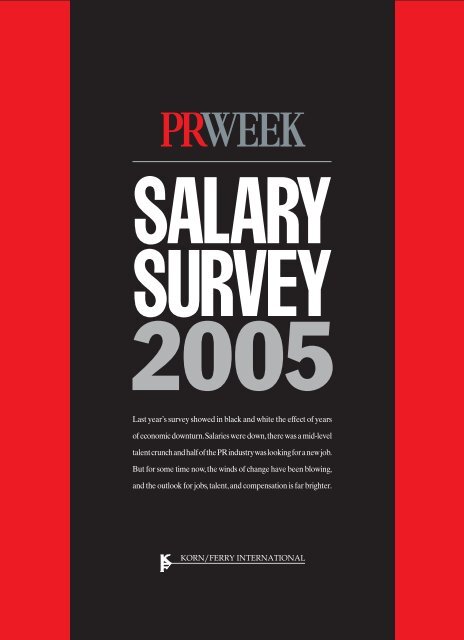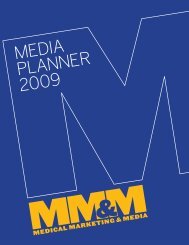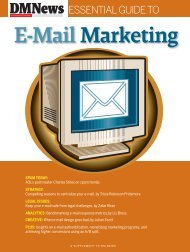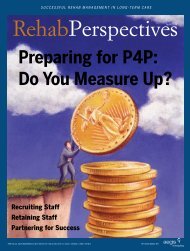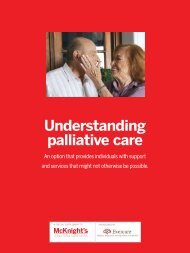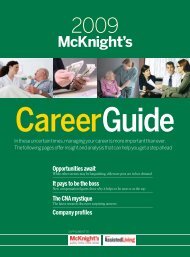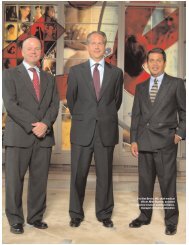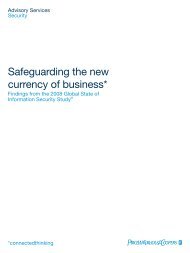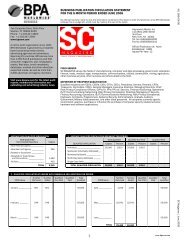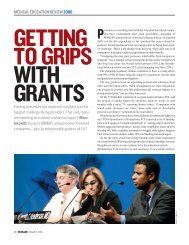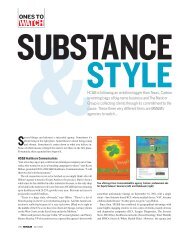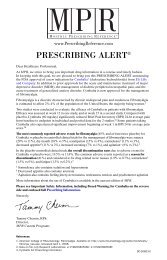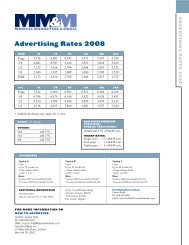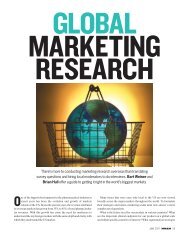2005 Salary Survey - Haymarket Media Group
2005 Salary Survey - Haymarket Media Group
2005 Salary Survey - Haymarket Media Group
You also want an ePaper? Increase the reach of your titles
YUMPU automatically turns print PDFs into web optimized ePapers that Google loves.
<strong>Salary</strong><strong>Survey</strong><strong>2005</strong>forPDF 2/15/05 7:01 PM Page 1<br />
SALARY<br />
SURVEY<br />
<strong>2005</strong><br />
Last year’s survey showed in black and white the effect of years<br />
of economic downturn.Salaries were down,there was a mid-level<br />
talent crunch and half of the PR industry was looking for a new job.<br />
But for some time now, the winds of change have been blowing,<br />
and the outlook for jobs, talent, and compensation is far brighter.
<strong>Salary</strong><strong>Survey</strong><strong>2005</strong>forPDF 2/15/05 7:01 PM Page 2<br />
SALARY SURVEY <strong>2005</strong><br />
Heading in the<br />
Salaries are up, the raise has returned,<br />
and recruiters are scouring résumés and<br />
companies for top talent. The job market<br />
is undoubtedly back. By Anita Chabria<br />
PR salaries are once again on the upswing as the<br />
strengthening economy continues to generate<br />
new business and organic growth for agencies<br />
and corporations alike.This year, the average<br />
salary of respondents in the PRWeek-Korn/<br />
Ferry International <strong>Salary</strong> <strong>Survey</strong> was $87,461,<br />
which represents a 7.19% rise over the $81,594<br />
they say they received last year.<br />
“Salaries have definitely risen in the past<br />
year,” says Nels Olson, practice leader of external<br />
affairs at Korn/Ferry. “Companies are<br />
spending more on their communications<br />
functions.”<br />
“This is the strongest economy on the agency<br />
side that I’ve personally seen since the first<br />
quarter of 2001,” agrees Donna Renella,VP of<br />
talent at Weber Shandwick and chair of the<br />
Council of PR Firms’ HR Roundtable.“For the<br />
first time in three years, salaries are becoming<br />
unstuck.I’m not going to say that the floodgates<br />
have opened, but what I will say is that people<br />
are able to be compensated for their increased<br />
contribution on a merit basis, as well as a promotion<br />
basis.”<br />
More than a quarter of respondents (26.4%)<br />
in this year’s survey say they are making<br />
between $50,000 and $74,999; 19.4% bring in<br />
between $75,000 and $99,000;and 26.4% report<br />
making above that amount (that’s up from<br />
23% who reported paychecks of that size for<br />
the prior year.) On the lower end of the pay<br />
scale, 9.9% are getting by on under $35,000,<br />
while 16.4% say they make between $35,000<br />
and $49,999.<br />
Hiring market heats up<br />
This good news about salaries also points to<br />
other bright indicators for PR,most notably one<br />
of the hottest hiring markets in recent years.<br />
Across the country and at all levels, recruiters<br />
are scouring résumés and raiding competitors<br />
to find talent at a rate that some are comparing<br />
to the dot-com days.<br />
“The top thing I take away from this is that<br />
the job market is back,”says Don Spetner,chief<br />
marketing officer of Korn/Ferry.“It’s a reflection<br />
of the end of cost-cutting and the stretching<br />
to the limits of productivity.It’s as if we’re emerging<br />
from the darkness and spring is here.”<br />
Those on the front lines of hiring PR talent<br />
say the bump in salaries, though still modest,<br />
may be the first warning of an impending shortage<br />
of good people as agencies and corporations<br />
continue to expand to meet new demands.<br />
Increasing salaries are a sign not just of a resurgence<br />
of business,they say,but also the resulting<br />
talent crunch many companies are suddenly<br />
facing after years of working with a minimal<br />
staff.As the hiring heats up, for the first time in<br />
recent memory,signs seem to be pointing to an<br />
atmosphere that favors employees.<br />
“There is competition out there now,” says<br />
Hill & Knowlton’s chief talent officer Ellen<br />
Shedlarz.“The past two years were clearly an<br />
employer’s market.It’s much more competitive<br />
this year. Everybody is sort of back in the<br />
spirit of hiring.”<br />
Sabrina Horn, head of technology PR firm<br />
The Horn <strong>Group</strong>, agrees. “There didn’t seem<br />
like there was a nice ramp up,” she says. “It<br />
went from being,‘I don’t want to hire anybody’<br />
to a hiring frenzy.”<br />
This year, 1,864 professionals, who have an<br />
average of 11.9 years in the business under their<br />
belts, responded to the survey. More than a<br />
third (36.9%) work in agencies.Another 24%<br />
are in corporate settings,while 12.8% are in the<br />
nonprofit sector.Slightly fewer (7.3%) are selfemployed.A<br />
small number of respondents also<br />
report working at IR agencies, government<br />
offices, trade associations, and other settings.<br />
The respondents also represent a range of<br />
professional levels, with 10.1% holding chairman<br />
or president titles, and 14.9% stating their<br />
position as directors or managers. About the<br />
same number (14.6%) fall into VP role,including<br />
EVP and SVP. PR managers make up one<br />
fifth (20.9%) of respondents, and another fifth<br />
(20.4%) come from the ranks of account supervisors,<br />
account managers, SAEs, and AEs. But<br />
no matter what title each respondent holds,they<br />
collectively prove to be a hard-working bunch,<br />
clocking an average of 48.1 hours in the office<br />
each week.<br />
Despite all that hard work, when it comes to<br />
gender, women are still far behind their male<br />
colleagues in terms of pay.The average man in<br />
the survey is breaking six figures with a salary<br />
of $107,960, while his female coworker toils<br />
away for an average of $75,498.<br />
Julie Biber,VP and director of recruitment at<br />
Edelman,is surprised by this.“When I talked to<br />
male candidates,”she says,“I’m not seeing them<br />
34.3%<br />
feel they’re wellcompensated<br />
in their current<br />
positions<br />
Compensation<br />
How well compensated do you feel?<br />
Base: 1864<br />
Undercompensated<br />
22.5%<br />
Well compensated<br />
34.3%<br />
Extremely well<br />
compensated<br />
9.3%<br />
Adequately<br />
compensated<br />
33.9%<br />
Job seeking?<br />
Yes, but not in PR—5.8%<br />
Job change<br />
Next increase Change incentive<br />
FEBRUARY 21, <strong>2005</strong> • www.prweek.com 16<br />
Subscriptions: 800-558-1708 • PRWEEK<br />
25<br />
20<br />
15<br />
10<br />
5<br />
0<br />
Yes, in PR<br />
29.8%<br />
11.8%<br />
None<br />
4.6%<br />
Under 2%<br />
27%<br />
2 to 3.9%<br />
21.1%<br />
4 to 5.9%<br />
9.2%<br />
6 to 9.9%<br />
8.2%<br />
10 to 14.9%<br />
No<br />
64.4%<br />
Base: 1864 Base: 1864<br />
What percentage raise do you expect at your<br />
next pay review?<br />
1.3%<br />
15 to 19.9%<br />
Base: 1864 Base: 1864<br />
1.4%<br />
20 to 24.9%<br />
0.4%<br />
25 to 29.9%<br />
<strong>Salary</strong> by gender<br />
US $ in thousands<br />
US $ in thousands<br />
100<br />
80<br />
60<br />
40<br />
20<br />
0<br />
120<br />
90<br />
60<br />
30<br />
0<br />
$37,678<br />
$87,461<br />
$35,331<br />
$56,558<br />
$54,587<br />
$107,960<br />
$86,295<br />
$72,035<br />
1.0%<br />
30%+<br />
$75,498<br />
Total Men Women<br />
Base: 1864 Base: 1864<br />
<strong>Salary</strong> by age group<br />
Base: 1864<br />
$108,780<br />
$90,533<br />
14.1%<br />
Don’t know<br />
$135,578<br />
$122.387<br />
25<br />
20<br />
15<br />
10<br />
5<br />
0<br />
10%<br />
5% or less<br />
No<br />
41.7%<br />
Don’t know<br />
27.4%<br />
10%<br />
15%<br />
20%<br />
Yes<br />
30.9%<br />
What minimum raise would make you<br />
interested in leaving your current job?<br />
13.3%<br />
<strong>Salary</strong> by industry<br />
Art/Ent../<strong>Media</strong> $74,722<br />
Financial services $104,119<br />
Food & beverage $86,139<br />
Govt./Public services $66,806<br />
Education $59,675<br />
Retail $70,708<br />
Sports $68,545<br />
Telecommunications $72,270<br />
Travel/Tourism/Leisure $93,239<br />
Trade association $69,966<br />
Healthcare/Pharma $93,349<br />
Tech/internet $105,852<br />
Nonprofit/Charity $59,712<br />
Industrial/Manufac. $105,963<br />
Other $102,081<br />
$129,830<br />
12.7%<br />
17.4%<br />
28.5%<br />
25% or more<br />
18.2%<br />
Wouldn’t leave<br />
0 20 40 60 80 100<br />
US $ in thousands<br />
21-25 years 26-30 years 31-35 years 36-40 years 41-45 years 46-50 years 51-55 years 56-60 years 61-65 years 66-70 years 71+<br />
$107,047<br />
Men Women<br />
Likely to change jobs within one year?<br />
$129,299<br />
$93,827<br />
$142,767<br />
$112,356<br />
$117.630<br />
$81,250<br />
$121,250<br />
$82,500<br />
$130,417
<strong>Salary</strong><strong>Survey</strong><strong>2005</strong>forPDF 2/15/05 7:01 PM Page 3<br />
right direction<br />
SALARY SURVEY <strong>2005</strong><br />
making $25,000 more”than female candidates.<br />
The gap may be due to factors other than gender<br />
bias,however.Recruiters say that more men<br />
tend to gravitate towards areas of PR that pay<br />
higher, such as financial communications. In<br />
addition,many women will leave the workplace<br />
to have children,often stranding them at lower<br />
salary levels when they return. Regardless of<br />
the reason, the disparity remains a concern,<br />
especially in an industry where women have<br />
been able to rise to the highest ranks.<br />
“It’s disappointing that there are still these<br />
artificial barriers left,”says Alan Arkatov,chief<br />
strategy officer at Los Angeles-based Rogers<br />
& Associates.<br />
Bill Imada,chairman and CEO of IW <strong>Group</strong><br />
PR,also based in LA,seconds that thought,but<br />
adds that PR is not alone.“It’s unbelievable,”<br />
he says, “but that actually falls in line with<br />
national statistics.”<br />
Less surprisingly, older survey respondents<br />
come out ahead on pay day, vastly outearning<br />
younger professionals. PR pros seem to break<br />
the $100,000 mark in their 40s.Those in the 36-<br />
40 age range report earning an average of<br />
$97,557,while those in the 41-45 range are some<br />
of the highest earners,bringing in an average of<br />
$128,510.The oldest respondents – those age 71<br />
and above – make the most,with an average of<br />
$130,417. That points to the increasing use of<br />
experienced communicators at the C-level as<br />
senior strategists and counselors.<br />
Just over 20% of respondents are also getting<br />
in the spirit of the rebounding job market and<br />
report taking a new job in the last year.Another<br />
30.9% say that they are likely to change jobs in<br />
the coming year.<br />
“People are willing to make moves,” says<br />
Spetner.“They are excited by new opportunities.<br />
Demand outstrips the supply right now.<br />
There is much less fear in the marketplace.”<br />
As well as the 29.8% who also admit they<br />
are currently seeking a new PR position,<br />
another very large percentage (49.9%) say<br />
they had been approached by a headhunter in<br />
the past year.<br />
Olson considers the large percentage of<br />
people who have met with a recruiter to be an<br />
excellent sign of “how robust the business is.”<br />
A premium on experience<br />
Interestingly,some of the toughest jobs to fill are<br />
junior to mid-level positions.Recruiters say that<br />
because of the downturn, many companies<br />
stopped hiring and training for the past two to<br />
four years.That makes it hard to find candidates<br />
with that amount of experience who are ready<br />
to begin a move up the job ladder.<br />
Renella asks,“If no one was hiring an entrylevel<br />
class in 2002,how many people with three<br />
years’ experience are available?”<br />
Michael Olguin, head of San Diego-based<br />
Formula PR,says he has encountered that problem<br />
often. He has also had difficulty with PR<br />
practitioners who began their careers during<br />
the dot-com boom and now suffer from having<br />
been promoted too quickly without having<br />
learned the necessary skills.<br />
“You get people who are just not that qualified<br />
and were overpaid for their experience<br />
level,” he says.“We had a [young woman] who<br />
had come in off the dot-com era and could not<br />
handle the pace and the expectations.”<br />
ChevronTexaco’s GM of public affairs Dave<br />
Samson says he has seen the same thing.<br />
“During the boom,frankly a lot of people got<br />
elevated titles and jobs that were beyond their<br />
experience levels,”he says.<br />
That’s good news for candidates with more<br />
traditional backgrounds, especially at wellknown<br />
companies. Having a high-profile<br />
résumé and an employment history with bigname<br />
entities can translate into a higher paycheck<br />
in this market.<br />
“If you’re going for people who are coming<br />
from blue-chip companies or senior posts at<br />
agencies, they tend to be more expensive,”<br />
says Samson.<br />
Certain sectors of the industry and certain<br />
markets are especially hot when it comes to pay<br />
and hiring.Not surprising,healthcare practices<br />
are always on the lookout for talent and offer<br />
some of the highest pay.Respondents who specialized<br />
in this area report an average income of<br />
$93,349. Most recruiters agree this is an area<br />
that never slowed down and saw little impact<br />
from the bad economy. However, specialized<br />
talent in this area is still scarce, making experienced<br />
people worth a premium.<br />
“Healthcare has been the place for the past<br />
three years,”confirms H&K’s Shedlarz.<br />
More unexpectedly,says Olson,“technology<br />
has come back really strong.” <strong>Survey</strong> results<br />
back this claim.Those specializing in tech/internet-related<br />
PR report a healthy salary average<br />
of $105,852. Locations known for tech PR also<br />
report higher salaries than other parts of the<br />
country. Silicon Valley and the Bay Area are<br />
once again hot markets. The average Silicon<br />
Valley/San Jose salary is $106,119, while PR<br />
pros in San Francisco are making an average of<br />
$108,985. Even Seattle comes in high, with an<br />
average of $101,700.<br />
However,the high cost of housing still makes<br />
it a challenge to find people willing to move to<br />
areas like San Francisco. “It’s hard to recruit<br />
up there,”admits Spetner.<br />
In a more general market focus, consumer<br />
goods is also a very busy practice area for<br />
hiring, although the salaries are not as robust<br />
as more specialized practices.The average food<br />
and beverage communications professionals<br />
report a salary of $86,139, while those in retail<br />
PR say they make $70,708.<br />
“Consumer seems to have been strong for<br />
most of this year,”says Kathy Cripps,president<br />
of the Council of Public Relations Firms.<br />
Olson points out that most of the highestpaying<br />
jobs, and many of the hottest markets,<br />
are still on the East Coast – for now. Boston<br />
(with an average salary of $132,087) and New<br />
30.9%<br />
claim they’re<br />
likely to change<br />
jobs in the<br />
coming year<br />
The senior ranks<br />
As Donald Trump would ask,is it book smarts<br />
or street smarts that gets you to the top?<br />
When it comes to the corporate PR world,<br />
schooling turns out to be less important than<br />
many people would imagine, according to a<br />
survey of those people at the very top of the<br />
PR profession – chief communications officers<br />
at Fortune 200 companies – conducted by<br />
Korn/Ferry International.<br />
Of the 53 CCOs who responded to the<br />
recent survey, only 29% have advanced degrees,<br />
and only five of those are in journalism<br />
or communications.The rest are split between<br />
MBAs,law,and others.<br />
“Traditionally in this function,the advanced<br />
degree is helpful, but practical experience<br />
far outweighs [its] value,” says Nels Olson,<br />
practice leader for external affairs at Korn/<br />
Ferry.“In the top searches we’re involved in,<br />
rarely,if ever,do they say an advanced degree<br />
is a requirement.”<br />
Even those in the PR education field agree<br />
with Olson.<br />
“I would not recommend six years of PR<br />
education,” says Jerry Swerling, head of<br />
PR studies at the USC Annenberg School<br />
of Journalism.Instead,he sees the PR masters<br />
as a tool for those trying to segue into the profession<br />
post-college.<br />
Korn/Ferry International compiled data on 53 chief communications officers of<br />
Fortune 200 companies (26% response rate from companies with revenue of<br />
$10 billion and above)<br />
PRWEEK • Subscriptions: 800-558-1708 17<br />
www.prweek.com • FEBRUARY 21, <strong>2005</strong><br />
GENDER<br />
Women<br />
34%<br />
AVERAGE COMPENSATION<br />
Men<br />
66%<br />
School might not be on the agenda for most<br />
of the survey respondents because this group<br />
has been busy at the office for the past few<br />
decades. More than a third of Fortune 200<br />
CCOs have 30 or more years’ experience in<br />
PR, while 36% have 25 to 29 years’ worth.<br />
Slightly less than a fifth (17%) have been on<br />
the job for 20 to 24 years,and only 8% come in<br />
between 15 and 19 years.<br />
And while women certainly are represented<br />
in the sample (34%),men still dominate at this<br />
high level. Olson, however, says he sees that<br />
figure changing.<br />
“You’re going to see a larger trend of more<br />
females in the top jobs,” he predicts. “It’s<br />
just a matter of time.They are working their<br />
way up.”<br />
Olson adds that he sees a trend of growing<br />
compensation for this top tier. The average<br />
base salary for a CCO is $327,000. But that’s<br />
not the whole picture. They also report an<br />
average annual bonus of $222,000 and a complete<br />
compensation package worth $549,000.<br />
That includes a range of stock grants worth<br />
$50,000 to $500,000. For the cream of the<br />
crop, 8% say that they have cash packages<br />
worth $1 million or more – proving that good<br />
communicators are apparently worth their<br />
weight in gold.<br />
YEARS EXPERIENCE<br />
20-24<br />
years<br />
17%<br />
15-19<br />
years<br />
8%<br />
25-29<br />
years<br />
36%<br />
Compensation $ amount<br />
Range of average annual stocks grants value: $50,000 - $500,000<br />
30 or more<br />
years<br />
39%<br />
Average Base <strong>Salary</strong> $327,000<br />
Average Annual Bonus $222,000<br />
Total Average Cash Package $549,000<br />
BREAKDOWN OF COMPENSATION PACKAGES DO RESPONDENTS HAVE AN ADVANCED DEGREE?<br />
$250K–$299K<br />
13%<br />
$300K–$499K<br />
30%<br />
Source: Korn/Ferry International<br />
$1Million<br />
or more<br />
8%<br />
$700K–$999K<br />
15%<br />
$500K–$699K<br />
34%<br />
Yes<br />
29%<br />
No<br />
71%
<strong>Salary</strong><strong>Survey</strong><strong>2005</strong>forPDF 2/15/05 7:01 PM Page 4<br />
<strong>Salary</strong> by job title<br />
US $ in thousands<br />
Base: 1864<br />
150<br />
100<br />
50<br />
0<br />
$162,191<br />
Chairman/<br />
President/<br />
CEO<br />
$126,867<br />
York ($115,730) remain the most lucrative<br />
markets, surprisingly followed by Milwaukee,<br />
where the average respondent is living well on<br />
$100,500 a year.<br />
“You see that in terms of the biggest jobs,the<br />
$1 million-or-more ones,they are still predominantly<br />
in the Northeast,”explains Olson.“That<br />
is because a number of those older, blue-chip<br />
companies are headquartered there.”<br />
Renella adds, “New York is an interesting<br />
market because it has the greatest supply of<br />
candidates,but also the greatest demand.”<br />
Despite so many areas of growth and the<br />
growing evidence of a hiring fever sweeping the<br />
industry,Jim Delulio,head of Southern California-based<br />
PR Talent, cautions that there isn’t a<br />
job-search frenzy yet.While people are willing<br />
to consider changing jobs, it is usually after<br />
some careful thought, and they are not willing<br />
to move just anywhere to grab a bigger pay-<br />
<strong>Salary</strong> by PR discipline<br />
Community relations $52,123<br />
check.There has to be a significant number of<br />
benefits to make the move attractive.<br />
“I am seeing people looking for the next<br />
right move and being more cautious about<br />
jumping,”he says.<br />
Motivating the talent<br />
Still, when it comes to motivators for job<br />
changes for survey respondents, money is still<br />
the top factor. Over half (54.7%) rate money<br />
to be “extremely important” or “very important.”<br />
Only three people (.2%) say it’s not<br />
important at all.<br />
Taking it a step further, more than a third of<br />
respondents (39.8%) say they are “very aggressive”<br />
or “aggressive” when it comes to salary<br />
negotiations,while almost half (45.4%) say they<br />
are “neutral”on the topic.For respondents who<br />
have taken a new job in the past 12 months,only<br />
11.3% say more money had been the reason<br />
behind the switch. Still, when asked what is the<br />
minimum pay raise that would interest a candidate<br />
in another position, more than half<br />
(54.3%) offer a relatively modest percentage<br />
between 5% and 25%.<br />
“There are variables like proximity to home<br />
and experience of management to consider<br />
before changing jobs, but otherwise I’d leave<br />
my current position for a 15% increase in<br />
salary,” says an AAE at a boutique PR firm in<br />
New Jersey (who did not want to be named),<br />
who currently makes $30,000.<br />
When it comes to increasing salary without<br />
a job switch, aspirations seem to be more<br />
modest.When asked what percentage increase<br />
in salary they expect at their next review,11.8%<br />
say none. Most respondents (48.1%) say they<br />
think their pay will increase between 2% and<br />
6%.Respondents are also split fairly evenly on<br />
their feelings about their compensation.Fortythree<br />
percent say they are well- or extremely<br />
well-compensated.”A slightly larger percentage<br />
(56.4%) complain that their compensation<br />
is either only adequate or that they are undercompensated.<br />
Aside from salary,candidates are once again<br />
asking about (and employees are demanding)<br />
Financial/IR $144,564<br />
Reputation management $120,612<br />
Brand management $92,331<br />
Crisis management $97,588<br />
COO<br />
Don Spetner... job candidates seek “a chance to<br />
blossom,to be appreciated,and to win”<br />
$104,789<br />
Director/<br />
Managing<br />
director/<br />
Partner<br />
Internal/employee comms $83,255<br />
Marketing comms $84,899<br />
Public affairs/Government $88,927<br />
Other $79,148<br />
$187,615<br />
0 30 60 90 120<br />
US $ in thousands<br />
EVP<br />
SALARY SURVEY <strong>2005</strong><br />
$155,108<br />
SVP<br />
$115,431<br />
VP<br />
$67,616<br />
PR<br />
manager<br />
Base: 1864 Base: 1864<br />
$64,134<br />
Account<br />
supervisor<br />
$53,273<br />
Account<br />
manager<br />
$49,850<br />
54.7%<br />
rate money as<br />
‘extremely’ or<br />
‘very’ important<br />
motivators for<br />
changing jobs<br />
SAE AE/PR<br />
officer<br />
programs for career development and opportunities<br />
for growth as part of the compensation<br />
discussion.<br />
“It’s going to become important for PR<br />
agencies to have good training and benefits<br />
because those are things that help retain people,”says<br />
Horn.<br />
Spetner agrees, saying that candidates are<br />
“looking for a chance to blossom, to be appreciated,and<br />
to win.”<br />
Similar to the statistics over the importance<br />
of money,over half (55.2%) of those polled say<br />
that they are extremely ambitious or very<br />
ambitious when it comes to attaining the highest<br />
professional rank possible in their career. But<br />
more than a quarter (26.9%) say they aren’t<br />
satisfied with the career opportunities within<br />
their companies. A further 32.8% say their<br />
company does not provide adequate training.<br />
That reality is making it more imperative for<br />
employers to provide talent with ways to grow<br />
within a company – or risk losing them to<br />
the competition.That means a renewed focus<br />
on creating an employee-friendly atmosphere<br />
that provides not only challenges, but also<br />
opportunities.<br />
“Culture and chemistry are two big parts of<br />
the equation,” says Edelman’s Biber, echoing<br />
what survey participants said about their reasons<br />
for changing jobs.“Candidates are looking<br />
for our philosophy, our vision, our value<br />
system.”<br />
Horn has seen the same trend.<br />
“The whole thing that we call the ‘employee<br />
experience’ is coming back in terms of its importance,”<br />
she says. “It’s something people<br />
appreciate and want.”<br />
Interestingly, while employees are demanding<br />
more from their employers,they are also less<br />
willing to acclimate. Just 9.9% give themselves<br />
an A+ on their willingness and ability to adapt<br />
to organizational politics.Twenty-five percent<br />
give themselves an A when it comes to fitting<br />
in,and another 23.4% say they rate an A-.<br />
Of respondents who had taken a new job in<br />
the past year, factors such as seeking new challenges<br />
(22.2%), promotion (12.4%), and bore-<br />
<strong>Salary</strong> by work setting<br />
PR agency $103,117<br />
IR agency $103,625<br />
Corporation $95,181<br />
Government $64,269<br />
Nonprofit $60,007<br />
Self/Freelance $84,905<br />
Trade association $86,789<br />
Education $57,744<br />
$39,789<br />
Other $65,709<br />
$71,557<br />
Freelance<br />
$53,587<br />
Other<br />
0 20 40 60 80 100<br />
US $ in thousands<br />
PRWEEK • Subscriptions: 800-558-1708 19<br />
www.prweek.com • FEBRUARY 21, <strong>2005</strong>
<strong>Salary</strong><strong>Survey</strong><strong>2005</strong>forPDF 2/15/05 7:01 PM Page 21<br />
<strong>Salary</strong><br />
by city<br />
Sacramento<br />
$70,100<br />
Base: 18<br />
•<br />
•<br />
•<br />
•<br />
• Seattle<br />
$101,700<br />
Base: 28<br />
dom/job dissatisfaction (12.1%) are cited as the<br />
reason for doing so.<br />
“They are making the decisions based on<br />
more than just compensation and benefits.They<br />
are making lifestyle changes,” says Chevron-<br />
Texaco’s Samson.<br />
H&K’s Shedlarz agrees, and says those<br />
lifestyle considerations become even more<br />
important to senior-level professionals.<br />
“The most important concern for any senior<br />
hire is the client experiences they’re going to<br />
have,”she says.“That is the number-one driver.<br />
That’s how people develop. That’s what gets<br />
them up in the morning.”<br />
Jenna Fisher, a recruiter with search firm<br />
Russell Reynolds,adds,“Part of it is that people<br />
move when they have the opportunity to have<br />
a bigger role.”<br />
That reality, explains Biber, has led some<br />
companies to go beyond just training to offer<br />
fast-track moves up the corporate ladder as a<br />
way to keep employees.<br />
“What I’m hearing is [that companies are]<br />
faster [in making] promotion moves than in the<br />
past to keep people,” she says.“[Agencies] are<br />
creating more opportunities within their firms.”<br />
Keeping with the need to entice employees<br />
beyond salary,perks are also once again a topic<br />
of interest. Vacations and flex-time inquiries<br />
from job candidates are on the rise in interviews.<br />
The survey results show that 28.5% of respondents<br />
say they currently are given 11 to 15 days<br />
•<br />
San Francisco<br />
$108,985<br />
Base: 71<br />
San Jose/<br />
Silicon Valley<br />
$106,119<br />
Base: 31<br />
Los Angeles/<br />
Orange County<br />
$86,789<br />
Base: 130<br />
San Diego<br />
$93,828<br />
Base: 18<br />
Dave Samson... people are changing jobs “based<br />
on more than just compensation and benefits”<br />
•<br />
Phoenix<br />
$74,719<br />
Base: 16<br />
• Denver<br />
$68,386<br />
Base: 22<br />
41%<br />
said they would<br />
be willing or very<br />
willing to move<br />
in order to get<br />
a better job<br />
SALARY SURVEY <strong>2005</strong><br />
Houston<br />
$76,708<br />
Base: 20<br />
Minneapolis<br />
$87,072<br />
Base: 25<br />
St. Louis<br />
$75,881<br />
Base:21<br />
•<br />
•<br />
Milwaukee<br />
$100,500<br />
Base: 10<br />
•<br />
Chicago<br />
$93,857<br />
Base: 117<br />
Dallas<br />
$74,620<br />
Base: 40<br />
•<br />
•<br />
off a year, 21.8% get between 16 and 20, and<br />
14.5% get between 21 and 25 days of vacation.<br />
“If I could choose between an extra week of<br />
vacation or a raise that was equivalent to the<br />
time off,I’d probably choose the vacation,”says<br />
Anne Williams, a PR account manager in Salt<br />
Lake City who didn’t want to name the agency<br />
she works for.<br />
Horn also points out that PR is a field with<br />
many women,and accommodating their needs<br />
is increasingly smart business for retention as<br />
well as hiring.“There are a lot of working moms<br />
out there, so flexible schedules are definitely<br />
something that we continue to hear about and<br />
provide,”she says.Others point out that fathers<br />
are often under the same pressures, and flextime<br />
is increasingly appealing to them as well.<br />
Compensation beyond salary<br />
Bonuses have also made a slight recovery from<br />
their dot-com popularity and subsequent belttightening<br />
demise. Of the 1,864 respondents,<br />
1,218 say they are eligible for a bonus this year.<br />
Sixty-one percent of those say it would be based<br />
at least in part on individual performance,while<br />
66.6% cite company performance as a factor,<br />
pointing to multiple aspects that go into determining<br />
bonuses.<br />
Horn adds that she is also seeing a slight<br />
resurgence in the popularity of signing bonuses.<br />
“That sort of fell by the wayside for the past couple<br />
of years,”she points out.<br />
•<br />
Detroit<br />
$80,655<br />
Base: 29<br />
Cincinnati<br />
$69,643<br />
Base: 14<br />
Atlanta<br />
$83,256<br />
Base: 54<br />
Ellen Shedlarz... “definitely seeing more of a<br />
willingness to relocate”by employees<br />
•<br />
Pittsburgh<br />
$53,083<br />
Base: 13<br />
•<br />
•<br />
•<br />
•<br />
•<br />
Columbus<br />
$95,511<br />
Base: 9<br />
Cleveland<br />
$92,625<br />
Base:12<br />
Boston<br />
$132,087<br />
Base: 53<br />
•<br />
•<br />
Wilmington<br />
$66,200<br />
Base: 5<br />
•<br />
•<br />
•<br />
•<br />
Miami<br />
$91,122<br />
Base: 17<br />
But Samson says that’s still not a common<br />
practice, and only in rare circumstances would<br />
his company consider a signing bonus.<br />
“We haven’t had to do to many of those this<br />
past year,”he says.<br />
Also returning from the dot-com days is a<br />
renewed interest in stocks and equity of all<br />
forms.Almost a third of respondents (30.3%)<br />
report owning shares in the company where<br />
they worked.<br />
“I would say you’re definitely seeing the<br />
structure of compensation packages changing,”<br />
says Olson.“You’re seeing many more grants<br />
of restricted stocks”instead of options.That has<br />
to do with accounting rules, he says. Other recruiters,<br />
however, also see it as a trend towards<br />
an entrepreneurial marketplace.<br />
“Over the past 12 months, I’ve seen a bit of<br />
a resurgence of venture capital and private<br />
equity-funded companies,” says Russell<br />
Reynolds’ Fisher.“And people are beginning to<br />
become more willing to move to more risky<br />
companies. I’ve had many candidates say to<br />
me point blank,‘Don’t make my compensation<br />
a hindrance.’ People are willing to take packages<br />
more focused on risk and reward rather<br />
than straight cash.”<br />
Porter Novelli’s global HR director Greg<br />
Waldron says this is a positive trend and that<br />
he would like to see more “novel approaches”<br />
to compensation in the PR industry. He fears<br />
that there is a cap to salaries since firms can only<br />
bill out a person at a certain rate. He adds that<br />
increasing competition for talent might make<br />
straight compensation deals too pricey for firms.<br />
Renella agrees that there is a limit to how<br />
high salaries can go.<br />
“We won’t be able to give that employee a<br />
25% salary increase and bill them out at the<br />
same margin,”she points out.<br />
One thing employees don’t seem to mind<br />
giving up is their hometown. More and more<br />
are willing to move if it means a good job.<br />
“We are definitely seeing more of a willingness<br />
to relocate,”says Shedlarz.<br />
Forty-one percent of survey respondents say<br />
they would be willing or very willing to move<br />
in order to get a better job,while only 7.2% say<br />
they would be very unwilling to pack up the U-<br />
Haul.And not many people say that they had<br />
turned down a job based on the need to relocate.In<br />
fact,more than half (56.7%) claim they<br />
had never done so, while 19.3% say they had<br />
done it only once in their careers.<br />
But Olson says that willingness to move does<br />
not come as a surprise.<br />
“Historically, [PR] has not had an issue with<br />
people relocating,” he says.“Across the board,<br />
most folks will move for the right opportunity.”<br />
•<br />
New York<br />
$115,730<br />
Base: 265<br />
Philadelphia<br />
$83,667<br />
Base: 39<br />
Baltimore<br />
$71,300<br />
Base: 20<br />
Washington,<br />
DC<br />
$86,742<br />
Base: 183<br />
PRWEEK • Subscriptions: 800-558-1708 21<br />
www.prweek.com • FEBRUARY 21, <strong>2005</strong>
<strong>Salary</strong><strong>Survey</strong><strong>2005</strong>forPDF 2/15/05 7:01 PM Page 22<br />
75.6%<br />
are committed or<br />
very committed<br />
to remaining in<br />
the PR industry<br />
Accreditation<br />
<strong>Salary</strong> by accreditation with the PRSA,<br />
IABC, or other<br />
US $ in thousands<br />
$102,031<br />
No matter what the future trends turn out to<br />
be, recruitment experts say that companies are<br />
already committed to aggressive retention and<br />
hiring strategies for the foreseeable future.<br />
“The overall tone or theme has been for firms<br />
or companies to do whatever it takes to keep<br />
their top players,” says Biber. “We are very<br />
conscientious of having a work-life balance.”<br />
PR Talent’s Delulio sees the same trend.<br />
“I think companies are being more aggressive<br />
about retaining,”he says.“But they are also trying<br />
to build a culture and an operating philosophy<br />
that engenders loyalty because, obviously,<br />
if you turn over your people, you are going to<br />
turn over your clients.Whenever there is a talent<br />
shortage, they focus on the need to have a<br />
culture and an employee-centered mentality.”<br />
Diversity issues<br />
Another area where companies are making a<br />
strong push in hiring and retention is in the<br />
diversity arena, and the experts agree that the<br />
numbers aren’t yet where they should be.<br />
The majority of survey respondents (63.1%)<br />
are women,which points to good gender diversity.However,most<br />
of the respondents (87.6%)<br />
are also white.About 5% are identified as black,<br />
while Asian practitioners make up 2.5%, Hispanics<br />
make up 4.4%, and Native Americans<br />
account for only 0.5%.Those figures are a far<br />
cry from demographic averages across the US<br />
and point to a serious need for more outreach<br />
into minority candidates.The lack of minorities<br />
is especially apparent at the top levels.<br />
“There are still not enough women and<br />
minorities at the senior-most levels and clients<br />
are asking for it,”says Spetner.<br />
Furthermore,the salaries of respondents who<br />
report being in an ethnic or racial minority are<br />
far lower than non-minorities.While the average<br />
Caucasian practitioner reports a salary of<br />
$90,056,black practitioners say they make only<br />
$67,223.The disparity is even greater for Asians<br />
and Native Americans, who report averages of<br />
$62,227 and $48,211, respectively. Hispanic PR<br />
pros fare a bit better at $75,622, perhaps pointing<br />
to corporate America’s growing recognition<br />
of this market.<br />
“I’m not surprised,” says IW’s Imada.“The<br />
communities of color are not typically getting<br />
the pay because they don’t have anyone who<br />
preceded them [in the agency or company]. So<br />
they typically start off in a lower-level position,<br />
as the receptionist, in the mail room, or they<br />
start off as an account coordinator.”<br />
Most agency recruiters say their companies<br />
SALARY SURVEY <strong>2005</strong><br />
$85,272<br />
Accredited Not accredited<br />
Base: 1864 Base: 1542 (undergrad); 415 (masters)<br />
Donna Renella... candidates from schools with<br />
“diverse populations has gone up considerably”<br />
<strong>Salary</strong> by degree major<br />
<strong>Salary</strong> by ethnicity<br />
US $ in thousands<br />
80<br />
60<br />
40<br />
20<br />
0<br />
$69,629<br />
$72,201<br />
$90,056<br />
$93,583<br />
$67,223<br />
$99,040<br />
$89,154<br />
PR/communications Journalism Business Liberal Arts Social Science<br />
$62,227<br />
White Black Asian Hispanic Native Other<br />
American<br />
are dedicated to diversity outreach, and have<br />
extensive programs in place on college campuses<br />
across the country, even reaching out to<br />
potential PR practitioners as early as their<br />
freshman year. Some say they are starting to<br />
see a payoff from those efforts.<br />
“On the entry level,the number of candidates<br />
that we are seeing from schools that are members<br />
of diverse populations has gone up considerably,”says<br />
Renella.<br />
Recruiters also say they are dedicated to this<br />
market because it represents untapped talent –<br />
something that can be in short supply in traditional<br />
hiring methods.<br />
“This industry tends to be a bit incestuous with<br />
hiring,”says Shedlarz.“If we don’t start to think<br />
outside the box, we won’t have fresh talent.”<br />
For H&K, Shedlarz says the solution is in<br />
being open. For example, her agency recently<br />
made a public affairs hire with no PR experience.<br />
Instead, the candidate had been deputy<br />
editor of the editorial group at the New York<br />
Daily News. “He brings a lot to the party in a<br />
different perspective,”she says.<br />
Rosanna Fiske, partner at Coral Gables, FLbased<br />
Communique/Rise Strategies and chair<br />
of the PRSA’s national diversity committee,<br />
also sees that progress has been made, and<br />
expects to see more.<br />
“It’s a matter of mathematics,” she says,<br />
pointing out that as the population continues to<br />
become more diverse, there will naturally be<br />
more diverse candidates and more diverse people<br />
moving into higher-paying roles.<br />
“More diverse society, more diverse workplace,<br />
more diverse candidates,” she says.“It’s<br />
just a reality that the older you and I get, the<br />
more diverse a society we’ll have in the US.”<br />
She adds that diversity may become a real<br />
recruitment tool in the future as younger generations<br />
place greater emphasis on having it.<br />
“For the younger generation, diversity is a<br />
part of their lives,” she notes. “Many of them<br />
almost require it.They see it as a need.”<br />
Another interesting figure on this year’s<br />
survey is the number of respondents with a<br />
degree in PR – an indicator of the growing number<br />
of universities that offer a specific program<br />
in this discipline. Over a third of respondents<br />
(35.9%) say they majored in the profession as<br />
undergraduates.Another 20% studied journalism.<br />
Only 4.8% came with a business degree.<br />
Renella points out that there are now 173<br />
accredited PR programs at US universities,<br />
which is a boon to recruiters.<br />
“It gives us much better candidates,”she says.<br />
$110,743 $109,668<br />
Undergraduate Masters<br />
$75,622<br />
$98,039<br />
$48,211<br />
$106,343<br />
$79,313<br />
$124,673<br />
“It also gives us more realistic candidates.”<br />
Jerry Swerling,principal of Swerling & Associates<br />
and director of PR studies at the USC<br />
Annenberg School of Journalism, agrees, and<br />
sees that such degrees are finally being granted<br />
a bit more respect.<br />
“Finally the value of PR education is being<br />
recognized by the industry,” he says. He also<br />
sees a PR degree as a benefit for hiring because<br />
“you have folks with a more rigorous background,<br />
folks who’ve really been seeped in the<br />
business, but also the business of the business.”<br />
But for most, PR education stops at the<br />
undergraduate level. Few practitioners continue<br />
on for an advanced degree. Among the<br />
respondents, 9.3% report having a masters in<br />
PR.Three percent say they have received a masters<br />
in journalism, and 5.8% say they have an<br />
MBA. Degrees above the masters level are<br />
almost non-existent: Fewer than 2% report<br />
having a PhD in PR, journalism, or business.<br />
But with or without a degree,the majority of<br />
respondents (67.1%) report that they find their<br />
jobs to be very rewarding or rewarding.Almost<br />
a third of those (30.8%) find their job to be even<br />
more rewarding than the year before.<br />
Most PR pros say that they enjoy their dayto-day<br />
work and find their jobs to be fulfilling.<br />
And an edifying 75.6% say they are very committed<br />
or committed to keeping communications<br />
as their career.<br />
Recruiters add that there is no reason they<br />
should not feel optimistic. With both salaries<br />
and opportunities on an upswing for the foreseeable<br />
future, the industry has a lot to offer<br />
both newcomers and veterans.<br />
“There has never been a better time to be in<br />
the business,” says Spetner.“And that will continue<br />
for the next 10 or 20 years.”<br />
The PRWeek <strong>Salary</strong> <strong>Survey</strong> <strong>2005</strong> was conducted<br />
by PRWeek and Millward Brown.<br />
The survey was open to all PRWeek readers.<br />
Respondents were invited via e-mail and<br />
were also allowed to enter the survey through<br />
PRWeek’s website.A total of 1,864 respondents<br />
completed the survey from January 18-31,<strong>2005</strong>.<br />
Results are not weighted.Based on this sample<br />
size,the results are accurate to a margin of +/-<br />
2.3% at a 95% confidence level.This report<br />
offers selected highlights only.The full survey<br />
results – offering numerous salary breakouts<br />
and opinion-based responses – are available in<br />
Excel format for $150.Please contact Christie<br />
Casalino at christie.casalino@prweek.com.<br />
FEBRUARY 21, <strong>2005</strong> • www.prweek.com 22<br />
Subscriptions: 800-558-1708 • PRWEEK<br />
US $ in thousands<br />
120<br />
90<br />
60<br />
30<br />
0<br />
Base: 1864


